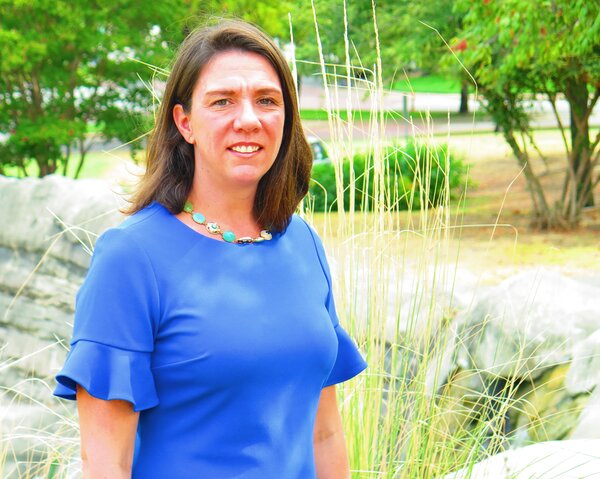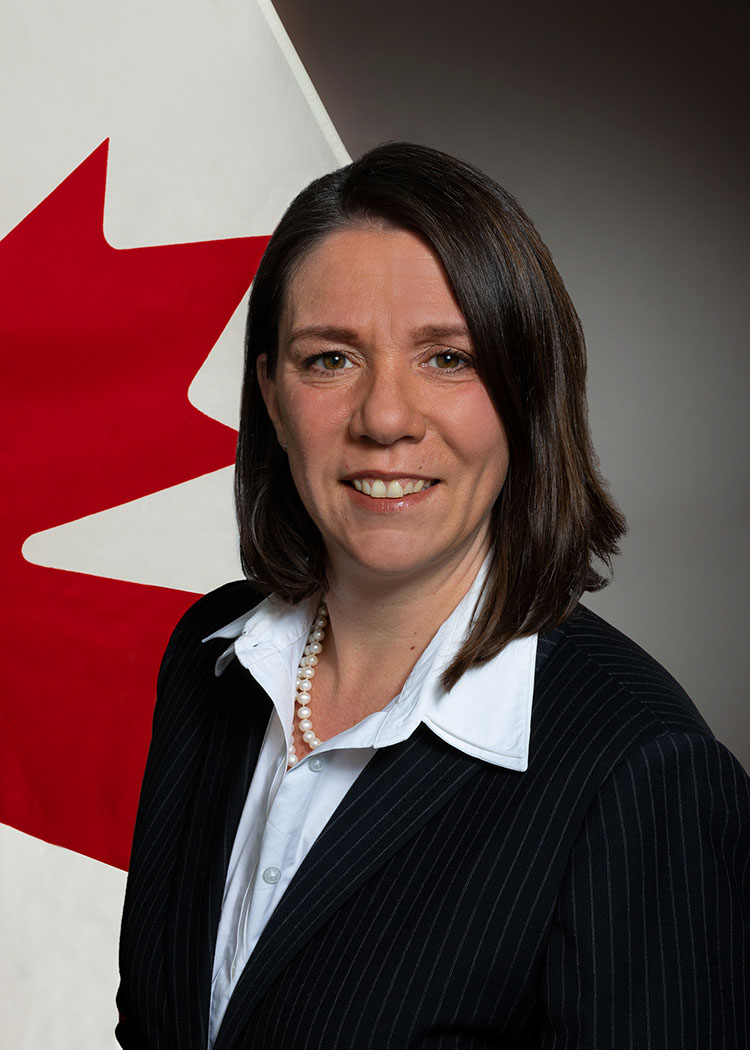
USask alumna named Consul General of Canada
Dr. Rachel McCormick (BA'97), a University of Saskatchewan (USask) alumna, is now serving as Consul General of Canada to the American states of Arkansas, Louisiana, New Mexico, Oklahoma and Texas.
By Shannon BoklaschukDr. Rachel McCormick (PhD), who was born and raised in Saskatoon, replaced Sara Wilshaw. The Honourable Chrystia Freeland, former minister of foreign affairs, announced McCormick’s new role alongside four other diplomatic appointments on Aug. 8, 2019.
McCormick (BA’97), who is now based in Dallas, Texas, previously served as head of the energy and environment section at the Canadian Embassy in Washington, D.C., from 2014 – 2019. She joined the Department of Foreign Affairs and International Trade in 2004 and has held positions within the Canadian energy sector and at the World Trade Organization in Geneva.
McCormick received her Bachelor of Arts degree (honours) in land use and environmental studies through USask’s College of Arts and Science, before earning her PhD in environmental science at the University of Calgary.
The College of Arts and Science recently asked McCormick some questions about her time at USask, as well as about the Canada-U.S. relationship and her new job as Consul General of Canada for South-Central United States.
Arts and Science: The Honourable Chrystia Freeland announced you as Consul General in Dallas in August 2019. How did you feel when you were named to this diplomatic role?
McCormick: Representing our country is truly an honour. At a time when there is much uncertainty and unrest around the world, Canada’s diplomatic corps plays an essential role. The United States is our closest ally and trading partner; we share infrastructure, supply chains, as well as a common environment. Becoming Consul General for the five south-central United States presented an opportunity to play a leadership role and contribute to the strong bilateral relationship that is essential for shared security and success for people and communities on both sides of the border. I’m proud to profile Canada’s commitments and priorities internationally, and it is really exciting to forge new connections for all levels of government and Canadian businesses. From a personal perspective, I am excited to be back on the prairies and enjoy the wide open skies and warm western communities.

Arts and Science: What is your focus in this role?
McCormick: A primary focus for me is business development. Every day the team here is working with Canadian companies, industry associations and government partners to strengthen opportunities for trade and investment. Texas alone has the 10th-largest economy in the world. They lead the U.S. in exports overall, specifically in energy and technology, and are home to the headquarters of a significant number of Fortune 500 companies. Arkansas also holds the headquarters for major multinationals.
Canada’s commitment to free trade, with tariff-free access to more of the global market than any other G7 country, as well as our investments in innovation and education, are of high interest to companies here. The region has investors interested in activities across Canada, and is also a gateway for regional supply chains in Latin America. As a result, we are working hard to have strong connections to provincial and territorial governments, and Canadian industry, to ensure we are profiling all we have to offer.
Secondly, I spend time engaging U.S. policy-makers and decision-makers to identify opportunities for collaboration and to advance Canadian interests, including with respect to international trade and our strong history of collaboration on security and defence. As such, I am working hard to establish relationships with governors, members of the U.S. congress, state legislators and mayors across the five states of Arkansas, Louisiana, New Mexico, Texas and Oklahoma. A third area of focus is connecting people through culture and experiences—whether it be our shared Francophone heritage in Louisiana, profiling Canadian music and film across the region, or healthy sporting competition between our teams.
Arts and Science: How did your previous work experiences prepare you for this role?
McCormick: The bulk of my career I have held positions focused on international engagement on natural resources and environmental issues, including their intersection with foreign policy and international trade. Most recently I spent five years leading the energy and environment team at the Canadian embassy in Washington, D.C. This included working with industry on both sides of the border with respect to energy infrastructure and policy. Energy is central to the economy here in the south-central United States and has significant ties to Canada, so I’m able to build on those efforts. My time in Washington also meant I arrived in Dallas with my finger on the pulse of efforts to modernize trade between our countries, and collaboration for safe and secure borders within North America.
Arts and Science: What have you enjoyed about the position so far?
McCormick: The best part of my job is definitely connecting with new people every day, most of whom have some kind of Canadian connection and a warm appreciation for Canada. I’ve also enjoyed learning about this region and connecting with Canadians here. One special activity that stands out is meeting with our astronauts working at NASA in Houston and talking about the role Canada is (playing) and can play in the industry, and the important scientific and engineering contributions we are making to the lunar gateway project. As an added bonus, my family was able to join me and see the operations there. Seeing my daughters marvel at what is possible, and engage with these world leaders, was amazing.
Arts and Science: You earned a Bachelor of Arts degree (honours) at USask in 1997. What was the best part of your USask education?
McCormick: I majored in land use and environmental studies, which was an interdisciplinary degree. We were able to choose a second major, and I chose economics, while others largely focused on physical sciences. At the time many questioned the decision, but my aim was to work for business while pursuing my passion for environmental performance. Developing the ability to integrate insights from different perspectives, and apply that knowledge to real-world problems, has served me very well in a professional capacity, and I think my education at the University of Saskatchewan provided an important foundation for that. It is now widely recognized that understanding the intersection of the economy and the environment is fundamental for their mutual success. Of course, I didn’t realize how important and rich my academic program was until after I was done. In the midst of it all, the best part was the friendships and intellectual debate that I enjoyed on campus. I have a lot of great memories from hanging out at Louis’, sitting in the Bowl and studying at Upper MUB.
Arts and Science: Why did you choose USask for your undergraduate degree?
McCormick: I guess you could say it is a family tradition, as I am actually a third-generation USask grad and even attended my parents’ convocations. Having visited the campus for events, and knowing all it had to offer, I never thought about another university for my undergrad. I still remember how excited I was when I attended orientation as a first-year student, and the feel of walking across the Bowl in the midst of the beautiful architecture.
Arts and Science: You are interested in energy and environmental policy. What sparked your interest in these areas?
McCormick: At a young age my parents took me to events like Earth Day, and my dad involved me in projects building solar heaters and composts. In high school I was in a program that included a strong emphasis on spending time in nature. Both my parents and teachers encouraged me to explore and ask questions about how our actions were impacting the environment. I was also intrigued by international trade, as NAFTA was being negotiated. A decade later, my doctoral research focused on how environmental issues related to trade and foreign direct investment in the energy sector.
Arts and Science: How would you describe the Canada-U.S. relationship?
McCormick: Deep. Invisible. Integrated. We are each other’s largest trading partners, and over $2 billion dollars of goods and services cross our border every day. We have the longest undefended border in the world, have fought alongside each other and have jointly defended the continent at the North American Aerospace Defence Command (NORAD) for over 60 years. Over 40 per cent of our border is water that moves back and forth between communities. We often share challenges—cyber security and the opioid crisis are current examples. However, as neighbours, we can take each other for granted, so it’s important to raise awareness about what is happening north of the border, and to constantly maintain and build lines of communication for our combined prosperity, security and health.
Arts and Science: What advice do you have for other women who are in positions of power?
McCormick: Find your authentic voice rather than camouflaging yourself to those around you. Be confident in the value of your contributions (I love the meme “value yourself like a pint of organic raspberries!”). Recognize the importance of different perspectives and ask questions as you tackle something new—not knowing isn’t a sign of weakness. Lead in creating an environment that rewards results, while understanding that setbacks and learning are part of finding success.
Article originally published on https://artsandscience.usask.ca/news.

